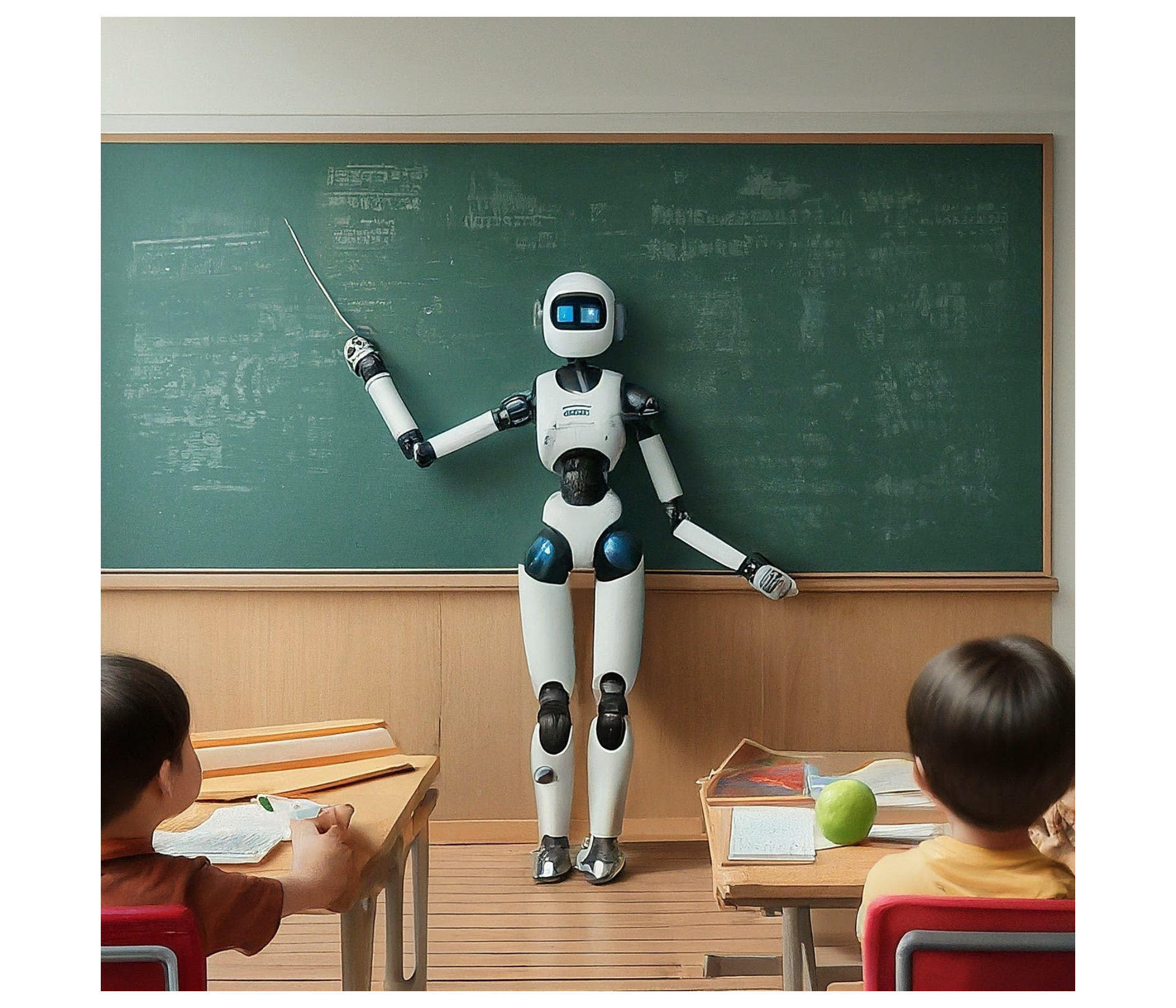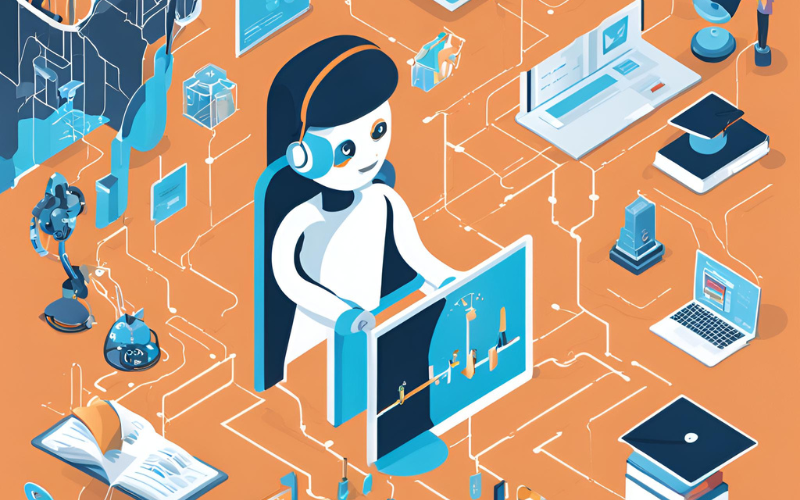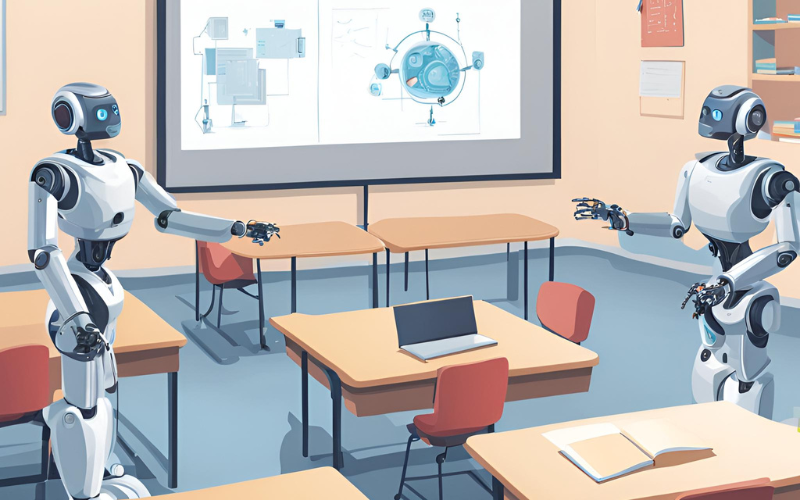The volume and frequency of news about Artificial Intelligence applications and tools has been unprecedented. Over the past year, I have attempted to provide coverage of singularly important releases like ChatGPT or occasional summaries of the AI news as it hits my inbox.
My most recent update about AI was January 8. This update does not attempt to cover the AI news since then. Instead, it covers the past two days (!) of news as it arrived in my inbox. I have organized it in categories like the previous two updates.
AI in Teaching
EdTech Review’s Russell Cailey writes in Are We Getting Artificial Intelligence Wrong? that educators not only need to understand AI but they need to embrace its potential to transform learning. “Make AI an integral part of the educational fabric rather than a vague concept.” He believes that project-based learning will benefit the most from AI.
Future Ed’s Alina Tugend wrote an article titled Navigating the Artificial Intelligence Revolution in Schools. The article provides an excellent overview for school board members, independent school board members, and for parties other than educators of where AI is being used in education.
Laura Hamilton and Kamal Middlebrook authored How AI Can Help Create Assessments that Enhance Opportunities for All Students for The74. Their article proposes creating a framework that focuses on developing a learn-centered assessment system using AI while keeping the human perspective of educators and students at the center of the experience.
Erik Ofgang wrote an article for Tech Learning titled I Created A Version of ChatGPT to Tutor College Students. Here’s What Happened. Mr. Ofgang used OpenAI’s new GPT feature to create a GPT that could help teach college students the essentials of journalism. The final product is called Newsroom Mentor for anyone with access to ChatGPT Plus. The Tech Learning article takes the reader through the original version and three subsequent edits before Mr. Ofgang finished his work.
Jeppe Klitgaard Stricker wrote an article titled Deep Learning: Five New Superpowers of Higher Education published in his Substack’s The Future of Higher Education column. The five new superpowers as listed by Stricker are: (1) hyper-personalized instruction, (2) adaptivity in the learning process, (3) expand access to high quality education by allowing complex subject matter to be encoded into software, (4) provide immediate formative feedback, and (5) redefine assessment through a continuous stream of interactions. While these five superpowers signal a potentially exciting future, Stricker warns that unlocking their power will require a lot of work.
Tech Learning’s Dr. Jennifer Parker wrote a review about Magic School AI. Many of the 67 tools that she cites as very useful to teachers are not unique. However, the single dashboard access and the enterprise version appear to be useful for districts or schools attempting to centralize their usage of AI tools.
Regulating AI
The European Union’s proposed AI Act was leaked to the public on Monday. Euractiv Tech Editor Luca Bertuzzi shared all 892 pages while a shorter 258 page version was shared by the European Parliament policy advisor Laura Caroli. The Act is expected to be adopted on February 2 by the EU Parliament. Thomas Macaulay of The Next Web reported that many tech industry leaders are concerned that the Act may stifle AI innovation.
The state of North Carolina released a guidebook for the use of generative AI in public schools. According to the state’s press release, the 34-page guidebook is organized around the five focus areas of the state’s digital learning plan.
The five focus areas are: leadership and vision; human capacity; curriculum, instruction, and assessment; data privacy and cybersecurity; and technology, infrastructure, and devices. North Carolina claims that they are the fourth state to issue guidelines on the use of generative AI in its K-12 schools.
AI Threats
Michael Kan wrote about the cybersecurity unit of the United Kingdom’s Intelligence unit reporting that AI is already enabling hackers to gain easier access to information systems. More specifically, AI “helps hackers perfect and streamline their attacks, making it easier to produce hard-to-detect phishing messages and malware.”
The UK’s cyber unit also worries about hackers using AI to quickly sift through the terabytes of data that they loot and find additional targets or enable them to launch blackmail schemes quicker.
ChatGPT and LLM News
Wired Magazine’s Will Knight wrote an article titled This Chinese Startup is Winning the Open Source AI Race about a little known startup from Beijing named 01.AI that released an open source model that outperformed Llama2, an LLM offered by Meta and similar to ChatGPT.
O1.AI is giving away its models in hopes of gathering enough developer support to help it “hatch some killer AI apps.” The company’s founder is Kai-Fu Lee, a pioneering AI researcher who worked for Microsoft and Google in China. Mr. Lee says that the next generation productivity tools should be mobile first, AI enabled and not look like Microsoft Office anymore.
AI Productivity Tools
Google Chrome is adding a few AI-enhanced features for its Mac and Windows versions in the U.S. The first feature is a writing tool that helps users respond to items on the web such as online forum sites. Another new feature, Tab Organizer, will automatically suggest and create groups for tabs that the user has opened. The third new feature is an image generation tool that allows users to change their computer’s “wallpaper” by subject, mood, visual style, and color.
Google Research announced the launch of Lumiere, “a Space-Time Diffusion Model for Video Generation.” The tool is a text to video model but deploys a different strategy (80 frames at 16 frames per second) to make videos more realistic. Anyone interested in the details of the technology can access the academic paper published by Google’s developers through the link on the Lumiere webpage.
Michael Acton from the Financial Times reported that Apple intends to run AI on its mobile devices. In fact, the company has acquired 21 AI startups since 2017. The most recent of these acquisitions was WaveOne, a California company specializing in AI-powered video compression.
Analysts believe that Apple intends to have AI chatbots and apps to run on the company’s hardware and software instead of being cloud-based. Expectations are that the release of IOS 18 in June will reveal many of these generative AI features.
AI Research
Learning Curve: Lessons from the Tutoring Revolution in Public Education was published in January 2024. Written by Liz Cohen, the report provides several specific case studies as well as a section outline the current and future role of AI in tutoring. “The most effective way to use artificial intelligence in schools is as a tool that supports rather than supplants educators.”
New York Times reporter Siobhan Roberts wrote an article about a PhD student’s initiative to build an AI model that solves geometry problems from the International Mathematical Olympiad competition. The name of the product is AlphaGeometry, and it approximates the same solution rate at nearly the level of an Olympiad gold medalist. The AI model pairs a neural network system with a symbolic engine good at reasoning. One innovation is that the model was trained on 100 million geometric proofs using no human examples.
I was reminded that the U.S. Department of Education published a report in May 2023 titled Artificial Intelligence and the Future of Teaching and Learning. The 60-page report was written after a series of four listening sessions with more than 700 participants during the summer of 2022.
The U.S. Department of Education issued its 2024 National Educational Technology Plan. The plan’s title is A Call to Action for Closing the Digital Access, Design, and Use Divides. It’s the first technology report issued by the Department since 2016. I will likely review the 95-page report at a later date.
Podcasts and Video Interviews
David Shapiro’s Systems Thinking video blog interviewed Jessica Parker, co-founder of the academic insight lab, under the topic of AI, Higher Ed, Purpose of Education, and Future of Work. The 59-minute interview is worth listening to. “Will there be a sharp decline in PhD students thanks to AI?” “Organizations have to decide that they’re not going to require higher ed degrees.” “Students have to weigh the pros and cons of experience and skills.” “We will see major changes in graduate degrees because of AI.
Entire fields of discipline will disappear over the next decade.” “Bloom’s 2 Sigma problem is that for students to make greater learning gains, they would have to have one-on-one support. Until Generative AI, it has not been possible to scale learning resources.”
Innovative Educators’ Friday 5 Live podcast talks with Dr. Jean Mandernach about how to navigate the maze of AI tools. Six takeaways from the podcast are:
- Assemble an AI Toolbox
- Students Need AI Literacy
- AI Tools are Changing the Way Students Learn
- AI Tools Can Let Educators Evaluate Students’ Thought Processes
- AI Tools Can Create Efficiency for Faculty and Staff
- Data Privacy and Addressing Bias in AI are critical concerns.
Edsurge’s Jeffrey R. Young led a podcast titled Inside the Push to Bring AI Literacy to Schools and Colleges. The guests on this month’s podcast are Susan Gonzales, founder of the non-profit AI & You, and Leo Lo, a professor of libraries and learning sciences at the University of New Mexico.
AI Webinars and Conferences
On January 25, Jeffrey Selingo’s Next Office Hour provides a free webinar titled Preparing Students for a Future of AI. Panelists are Marty Alvarado, VP of Jobs for the Future; Lance Eaton, Director of Faculty Development and Innovation at College Unbound; and Taniya Mishra, Founder & CEO of SureStart. Topics covered include:
- How faculty members are changing their syllabi to focus on AI skills
- What might the impact of AI be on future career options?
- Ways general education and curricular options might be adapted to ensure students have adequate AI literacy as well as specific skills.
- How to infuse interpersonal skills and discussions about the ethical and moral ramifications necessary to navigate an AI world.
SHRM’s AI + HI Project is designed to focus on innovative and forward-thinking collaborations between Artificial Intelligence and Human Ingenuity in the Workplace. Registration for the three day conference at Microsoft’s Silicon Valley campus over March 4, 5, and 6 is now open.
Future of Work in AI
Boston Globe reporter Hiawatha Bray wrote an article titled Will AI take our jobs? Maybe not just yet. Ms. Bray interviews Neil Thompson, Director of the Future Tech research project at MIT’s Computer Science and Artificial Intelligence Laboratory. Mr. Thompson’s team submitted a paper to the Management Science journal that AI systems must be good enough to justify the cost of installing it and redesigning the way the job is done before humans in jobs can be replaced.

Over a three-year period, Mr. Thompson and his team identified 420 commercial and industrial tasks where an AI system with machine vision might be capable of supplanting human workers. As it turned out, the visual aspect was just one small part of a worker’s responsibilities. Reassigning the visual responsibilities to AI would only eliminate 23 percent of the costs related to these workers.
Final Thoughts
As I sifted through my emails to compile this article, I noted that it might be easier to do so using one of the many AI tools available. Unfortunately, I don’t have the time to teach myself how to do that since my weekends are occupied watching the NFL playoffs and NCAA men’s basketball games.
Instead, I’ll probably cut back writing these updates and recommend a newsletter or two. One of my favorites is Neat Prompts’ Prompts Daily email (scroll to the bottom of the linked page to subscribe). I’d rather spend my time reading through the more extensive reports and summarizing them for others.











